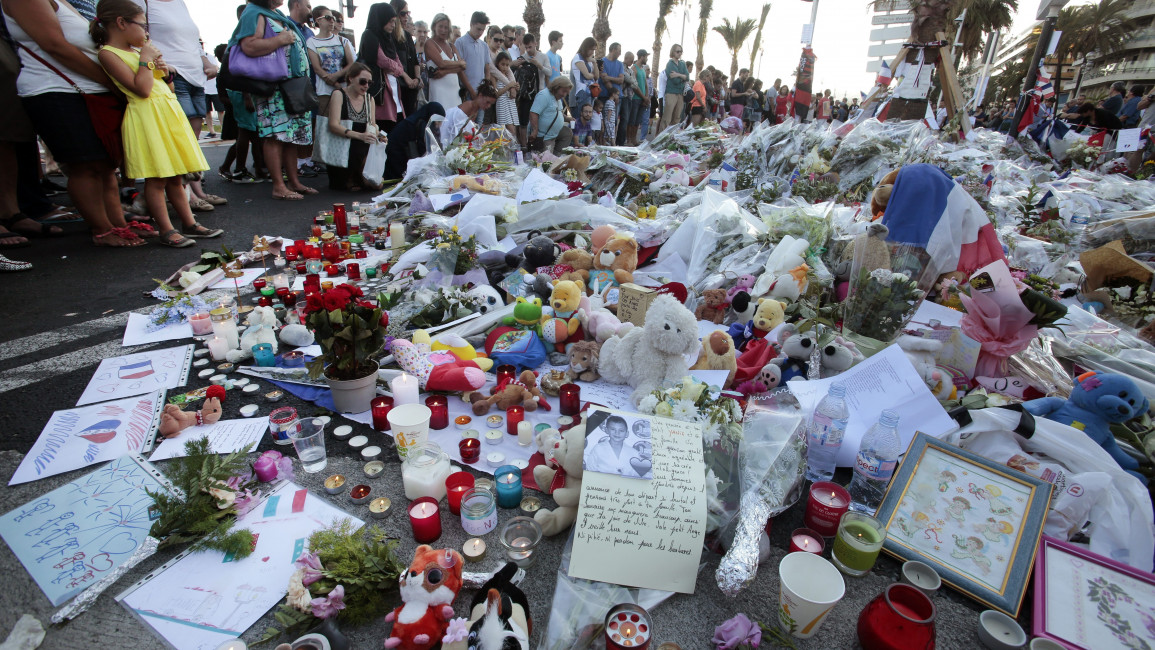French court sentences suspects involved in 2016 Nice terror attack
French judges on Tuesday ordered prison terms for eight suspects charged in the harrowing 2016 terror attack in Nice, where a suspected Islamist attacker rammed his truck into a night-time crowd celebrating the July 14 national holiday.
Two men were sentenced to 18 years for helping Mohamed Lahouaiej-Bouhlel, a 31-year-old Tunisian, prepare the attack that killed 86 people and injured over 450 during a four-minute rampage on a seafront embankment in the southern city before being shot dead by police.
Judges determined that Mohamed Ghraieb and Chokri Chafroud had to have known about the attacker's turn to Islamist radicalism and his potential to carry out a terror attack, based on records of phone calls and text messages among the three in the days ahead of the massacre.
Ghraieb, a 47-year-old from the same Tunisian town as Lahouaiej-Bouhlel, and Chafroud, a 43-year-old Tunisian, are also accused of helping to rent the delivery truck. They denied the charges.
"The court is strongly convinced that the author of the attack was associated as much with Mohamed Ghraieb as with Chokri Chafroud in his determination and in carrying out his criminal act," presiding judge Laurent Raviot said.
Ramzi Arefa, 28 - who admitted to selling Lahouaiej-Bouhlel the semi-automatic pistol he fired at police, without hitting anyone - was handed a 12-year term.
But he was not accused of criminal association with a terrorist or of being aware of Lahouaiej-Bouhlel's potential for launching an attack.
The Islamic State group later claimed him as one of its followers, though Raviot confirmed that investigators had not found any concrete links between the attacker and the jihadists who at the time controlled swaths of Iraq and Syria.
The five other suspects, a Tunisian and four Albanians, were sentenced to prison terms of two to eight years on charges of weapons trafficking or criminal conspiracy, but without any terrorism link.
Brahim Tritrou was the only suspect tried in absentia after fleeing judicial supervision to Tunisia, where he is now believed to be under arrest.
Some 30,000 people had gathered on the Nice seafront to watch a fireworks display celebrating France's annual Bastille Day holiday on July 14 when Lahouaiej-Bouhlel unleashed his rampage.
According to French and Tunisian press reports, his body was repatriated to Tunisia in 2017 and buried in his hometown of M'saken, south of Tunis. This has never been confirmed by the Tunisian authorities.
France has been buffeted by a wave of Islamist terror attacks since the killings at the satirical Charlie Hebdo newspaper and a Jewish supermarket in Paris in January 2015, often by "lone wolf" attackers acting in the name of IS or other jihadist groups.
In October, a Paris appeals court upheld the life sentence of Ali Riza Polat, accused of helping to find the weapons for the Charlie Hebdo attackers.
The Nice trial took place at the historic Palais de Justice in Paris, in the same purpose-built courtroom that hosted the hearings over the November 2015 terror attacks in Paris that left 130 people dead.
A special venue was also set up in Nice to allow victims to follow proceedings via a live broadcast.
For many of the victims, the sentences sought by prosecutors failed to match the scope of the suffering.
Nice mayor Christian Estrosi, who was a witness in court as he was in charge of the city's security at the time of the attack, said "nothing will ease the immensity of the suffering of those who have lost near ones".
"I am relieved, a little at peace that there has been justice after all," said Aurelie Amani-Joly, 52, who suffered injuries in the attack and is still undergoing treatment.
During the trial, many of the survivors gasped in horror when prosecutors showed grisly video footage, never seen publicly, of the vehicle as Lahouaiej-Bouhlel swerved through the crowd, trying to mow down as many people as possible.
Laurence Bray, one of the attack victims who attended the sentencing, said she was "very happy" that Ghraieb and Chafroud were sentenced to 18 years, more than the 15 years prosecutors had requested.
"But then again, for everyone who lost a loved one, 18 years is nothing," she told AFP.



